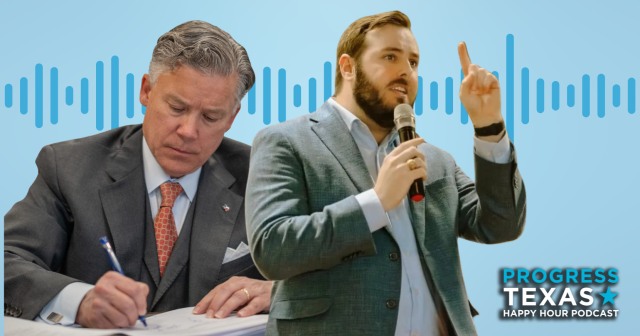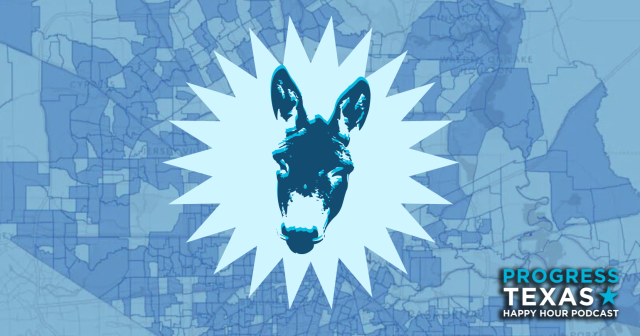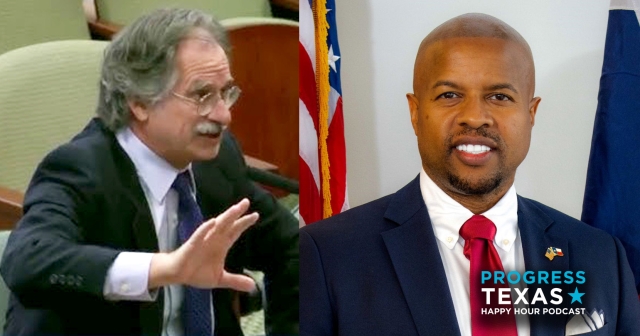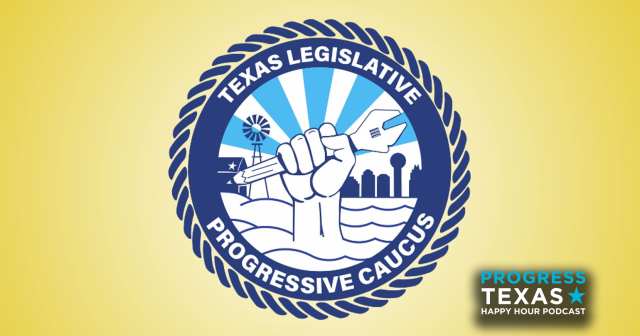My Tax Dollars Pay for WHAT?!?!
Progress Texas is proud to announce a new campaign to increase revenue in our state so we can better invest in our future. The campaign, which starts today and will likely last for years (more details below), is built around a simple idea: we need to create a process to FREE our tax dollars - Find, Review, and End Exemptions in our tax code that are no longer needed.
We are urging our members - and their friends, families, and all Texans who care about investing in our future - to support a bipartisan bill, Senate Bill 140, by Senators Rodney Ellis (D-Houston) and John Carona (R-Dallas), which would scrub the tax code. The Senators laid out the argument for this bill very well in an op-ed that was published across the state. The following is an excerpt from what ran in the Dallas Morning News, "A sunset review for state tax breaks" (January 27, 2013):
The Texas Tax Code contains numerous tax loopholes, many of which were inserted into the code in the distant past but live on long past the time the rationale for their existence has ended. Recent press reports estimate that, at a minimum, Texas spends $19 billion annually on these incentives. Yet despite this price tag, state agencies responsible for Texas’ finances are unable to provide a comprehensive list of tax preferences, much less detailed analyses. The sad fact is that the state agencies responsible for Texas’ finances are unable to determine exactly how many of your tax dollars are spent on tax loopholes, because no one even knows how many are in the tax code, how much they cost, or if they are even working.
Our ongoing budget challenges demand that we be as prudent as possible with all of our tax dollars, yet the state lacks a basic method to review and determine the effectiveness of a host of tax preferences and incentive programs. Texas needs a consistent, thorough review process to provide the public and policymakers alike with information on tax preferences’ successes and shortcomings.
Texas’ population is predicted to almost double over the next 50 years. That enormous influx of new Texans, both from migration and natural population growth, will require significant investment in our state’s infrastructure. Everything — from our water resources to transportation needs to the number of classrooms — will have to grow to meet our burgeoning population. It is crucial we meet this need, and to do so we must ensure that our tax dollars are being used as smartly as possible. All Texans must have the necessary information to help make important decisions about where to place our limited public resources.
We could not agree more - which is why we are urging all Texans to contact their state senator and urge him/her to support and co-sponsor SB 140. Below is an overview of our campaign, background on the issue, and more on how you can take action and get involved.
Overview of Our Campaign
The idea is simple: we need to free up our tax dollars so we can invest in our future - finding more money for schools, health care, water, transportation, environmental protection, public safety, and all the other big ideas our state can successfully pursue. To do that, we must free our tax dollars:
Find - identify all the specific exemptions in the tax code
Review - create a process to evaluate which ones work, and which ones don't
End - close the loopholes that have long outlived their purpose
Exemptions - prioritize education & health care over unnecessary tax breaks for country clubs and corporations
Our campaign starts today, but will likely last for years. We anticipate multiple stages will be needed - and like with most new endeavors, the first step is always the hardest.
Senate Bill 140 is a bipartisan bill by Senators Rodney Ellis (D-Houston) and John Carona (R-Dallas) that would get us started down the path of finding, reviewing, and ending unnecessary exemptions in our tax code. We're asking for Texans to contact their Senators to co-sponsor the bill because, as it currently stands, it has been in a Senate subcommittee for several weeks. It has to get voted out of the subcommittee, out of the full Senate Finance Committee, voted off of the Senate floor, and then go to the Texas House of Representatives. That's a lot of steps - but if we get multiple Senators to co-sponsor the bill and show there is real support behind their excellent idea, then it has a greater likelihood of moving through the process.
Once the bill is passed - whenever that day comes - we will only have started. SB 140 will help us find and scrub the tax code to identify all the exemptions, but then we'll need to review them and weigh their relative importance. Only then will we be able to build a case to end specific exemptions, and finally free our tax dollars to invest in the the future of Texas.
It will be a long fight - but it is the right fight, one that is essential to Texas. And don't forget - this is a bipartisan fight. This isn't about Democrats and Republicans. This is about making sure our tax dollars go to what is most important to us and that we prioritize what is necessary for future generations of Texans.
Background on the Issue
Every year, the Texas Comptroller produces a Tax Exemptions & Tax Incidence Report. The report outlines exemptions in the tax code by category, but doesn't specify exactly which companies avail themselves of which specific exemptions. However, thanks to the work of the Legislative Budget Board, we already know of several major tax exemptions that should be closed:
Unnecessary High-Cost Natural Gas Tax Exemptions Cost Texans $1 Billion a Year
Reducing an old & outdated exemption to the fracking industry would save Texans $1 billion a year, according to the Legislative Budget Board. As State Impact reported in their story, "New Report Suggests Reducing Fracking Tax Exemptions" (January 17, 2013):
In its new report, the LBB recommends changing the way the law calculates drilling costs associated with “high-cost gas” — a term that encompasses hydraulic fracturing, which is generally more expensive than conventional drilling. Currently gas production is taxed at a 7.5 percent rate (relative to its market value), but special provisions in the tax code such as the high-cost tax exemption “have reduced many producers’ tax liabilities to zero,” according to the report. The change would allow drillers to claim smaller exemptions.
In 2011, 55 percent of gas production in the state came from “high-cost” wells, according to the report. That’s up from only 5 percent two decades ago. The exemption has reduced payments to the state by an average of $1.2 billion per year between 2004 and 2011, according to the report.
You can read the full LBB report on the high-cost natural gas tax exemption here.
Corporations Get a Discount for Paying Their Taxes on Time, aka, the "Wal-Mart Loophole"
Individuals don't get a discount for paying their taxes on time - but corporations do, and it costs the state a lot of money just to convince corporations like Wal-Mart to follow the law. From an LBB report on the issue:
Texas allows businesses to retain a portion of state sales tax collections to compensate them for their effort in collecting and reporting sales tax. Additionally, retailers can retain an additional amount of sales tax collections for remitting estimated collections prior to their due date. These discounts cost the state more than $200 million each year.
You can read the full LBB report on the sales tax discount here.
22 Harris County Country Clubs Use the "Greenbelt Act" to Avoid Paying Millions in Taxes
In Harris County, 22 of 26 private country clubs take advantage of the special appraisal for a combined value loss of over $164 million. This incredible loophole - which even the Texas House Chairman of Ways & Means, which oversees tax laws, didn't know about - was fully explained in a recent Houston Chronicle article, "Some tax breaks have become par for the course" (March 17, 2013)
Twenty years ago, the Sunday front page of the Houston Chronicle reported that in Harris County "a dozen posh country clubs are receiving a special tax break that allows the exclusive clubs to avoid paying almost $1.6 million in property taxes each year." Chief among them was the River Oaks Country Club, whose well-tended golf course is the playground of Houston's elite.
Nestled next to downtown, that property was taxed at a fraction of its market value. Nothing has changed in the subsequent two decades, except the lost tax income - at a time when the Houston Independent School District is considering a tax hike - now exceeds $4.5 million annually.
Take Action and Stay Involved
These three examples are just a few of the many exemptions granted to Texas corporations. There are countless others, but there's no way for us to know exactly what those exemptions are and whether or not they are still essential to the state of Texas.
We are asking our members to share this action with their friends, families, and neighbors - and to help us get the word out about Senate Bill 140. There are also many other things you could do, including:
- Call your State Senator personally (directory here) to urge them to support SB 140
- Write a letter-to-the editor to your local paper in support of SB 140 and closing tax loopholes
- Share this action on Facebook and on Twitter
As the Texas Legislative session finishes and we move into the summer and campaign seasons, we will have new phases of this campaign and more opportunities to take action on this issue. We hope you will share this action with your friends, families, and neighbors, and help us FREE our tax dollars - Find, Review, and End Exemptions - to better invest in the future of Texas.
DONATE
Your donation supports our media and helps us keep it free of ads and paywalls.








